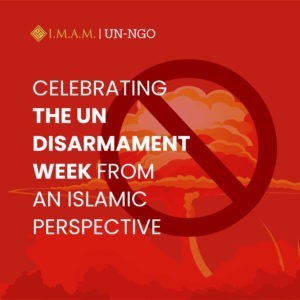Celebrating the UN Disarmament Week From an Islamic Perspective

The UN designated the last week of October as Disarmament Week. This week seeks to promote awareness and a better understanding of disarmament issues and their cross-cutting importance.
The Imam Mahdi Association of Marjaeya (I.M.A.M.), an NGO with consultative status with the Economic and Social Council (ECOSOC) based on its beliefs, principles, vision, and work policies, responds to this call and supports any effort to disarmament and strengthen world peace.
In this article, we first discuss the background and importance of this naming and then the Islamic teachings in denying the use of weapons of mass destruction and the importance of disarmament for world peace and security and the protection of God’s creatures, including mankind and nature.
Background:
Throughout history, countries have pursued disarmament to build a safer, more secure world and protect people from harm since the foundation of the UN; disarmament and arms control have played a critical role in preventing and ending crises and armed conflict. But the desired result has not yet been achieved.
Weapons of mass destruction, notably nuclear weapons, new and emerging weapon technologies, such as autonomous weapons, continue to be of primary concern due to their destructive power and their threat to humanity.
Current Situation:
Measures for disarmament are pursued for many reasons, including maintaining international peace and security, upholding the principles of humanity, protecting civilians, promoting sustainable development, fostering confidence and trust among States, and preventing and ending armed conflict. Disarmament and arms control measures help ensure international and human security in the 21st Century and therefore must be an integral part of a credible and effective collective security system.
The UN continues to celebrate the efforts and involvement of a range of actors contributing to a safer, more peaceful common future through disarmament, arms control, and non-proliferation efforts.
In a world threatened by weapons of mass destruction, conventional arms, and emerging cyber warfare, United Nations Secretary-General António Guterres presented a new agenda for disarmament to save humanity and secure our shared future.
What Can Be Done? Our Vision
I.M.A.M, as a religious- educational institution – fully endorses the UN Secretary-General, Mr. António Guterres’ position: “Disarmament must be brought back to the center of our common efforts for peace and security.”
To add to his remark, it might be more efficient if the following steps are taken into the disarmament movement, especially if the UN Security Council puts more effort:
1- The international community, with no exception, should disarm starting from the top of the list, at least unconventional weapons of mass destruction, such as nuclear, microbial, and chemical weapons.
2- All UN members should commit to disarming and would not accept any new membership without this condition.
3- All involved states stop producing, storing, using, and selling such weapons.
It is worth recalling some parts of two Quranic verses that God says: “Why do you say that which you do not do?1 Saying what you do not practice is hateful to God.”2
In addition to indicating the guilt of such behavior, these verses can also remind us of the ineffectiveness of words, declarations, resolutions, and laws that are not accompanied by proper action.
In other words, when members of the UN are the owners, manufacturers, users, and sellers of weapons of mass destruction, UN efforts to disarm the world, though valuable, are unlikely to succeed.
We call on all states, civil society, and religious leaders and institutions to join in and strengthen the disarmament movement to help ensure global security, peace, and the protection of the environment, which is in our hands as a divine deposit that needs to be preserved for future generations.
This invitation is not only due to an urgent and universal need for peace and security but also in the implementation of an Islamic order.
The Quran condemns someone and describes the end of his work as horrible. The behavior of this person – who is a symbol of all abusers of power – is as follows: “When he gains power, he strives to spread corruption on earth, destroying properties and lives. God does not like corruption.”3
Another possible translation of this verse is: “When he gets power, he directs all his efforts to spread mischief in the land, destroy harvests, and kill the human race, whereas Allah does not like mischief.”4
The use of weapons of mass destruction that leads to the destruction of a human generation and the contamination of invaded lands for decades and their non-cultivation and living are examples of behavior that the Holy Qur’an rejects.
From a religious and humanitarian standpoint, we support all efforts to disarmament and invite everyone to join this movement.
More information about the history of Disarmament Week, UN Office for Disarmament Affairs, including The UN Disarmament 2020 Yearbook: as well as Atomic Energy, is available respectively at:
https://www.un.org/en/observances/disarmament-week
https://www.un.org/disarmament
1. The Holy Quran 61: 2. Hilali & Khan translation.
2. The Holy Quran 61: 3.
3. The Holy Quran 2:205, Itani translation.
4. The Holy Quran 2:205, Maududi translation.
I.M.A.M. | UN-NGO
Disclaimer: I.M.A.M. is a non-profit religious organization. Thus, it has no political agenda, nor does it participate or intervene in any type of political activity. More importantly, the opinions in this article do not necessarily reflect the views, opinions, and religious edicts of the Religious Authority (marjaeya).

Leave a Comment:
You must be logged in to post a comment.